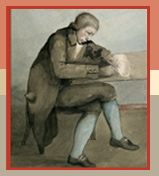The agricultural commentator and farmer
Iolo lived in a period of great change. During his lifetime Wales was developing an urban economy which relied heavily on industry.
In 1796 Iolo offered his services to the Board of Agriculture who were looking for someone to write a report on the agricultural economy of south Wales. The Board's role was to assess the state of agriculture in the kingdom, as well as promoting modern agricultural practices.
Iolo's travel journals demonstrate that he was a suitable candidate for the post. In the first place, he had pored through the Board of Agriculture's initial reports (1792 and 1794). He was already familiar with the country and its characteristics as a result of the frequent trips he had made around Wales over the years in order to collect and copy manuscripts. He was also familiar with the geography of south Wales. Furthermore, he had spent a short period farming land in Wentloog, near Rhymney, Cardiff. He had inherited land from his father-in-law Rees Robert(s) in 1781, and two years later he rented more land in Llandaf (NLW 21389E, f. 8).
As a farmer he experimented with Indian corn and he took an interest in new techniques developed by progressive agriculturalists of his age such as Arthur Young and William Marshall. The farming venture came to end, however, when Iolo was imprisoned for debt in August 1786.
Although he was suitable for the post with the Board of Agriculture, Iolo was not chosen. It is highly likely that his radical politics proved too much of an obstacle for the members of the Board. They feared that he would not be able to desist from insulting priests and tyrants in his agricultural notes. (See the letter from William Matthews to Iolo, 6 October 1796) Eventually, Walter Davies (Gwallter Mechain) was commissioned to undertake the report on north Wales and he also agreed to write the report on south Wales.
However, from 1801 onwards, Owen Jones (Owain Myfyr) and William Owen Pughe managed to persuade Iolo to assist Walter Davies in preparing the report on south Wales. Davies relied heavily on Iolo's papers and manuscripts and, although he acknowledged Iolo's assistance, he did not elaborate on the extent of the debt he owed to him. To a large degree, therefore, Iolo was the unofficial co-author of A General View of the Agriculture and Domestic Economy of South Wales (2 vols., London, 1815).


